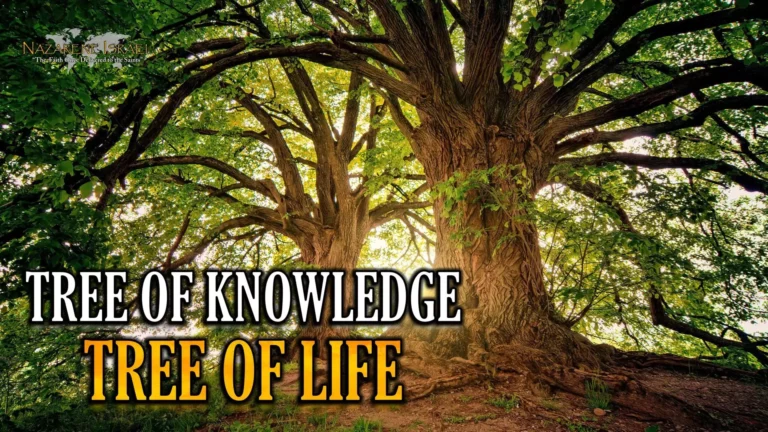Pendente de Tradução
Revelation 22:14 tells us that those who perform His commandments will have the right to the Tree of Life, that they may enter into the gates of the city (Renewed Jerusalem).
Hitgalut (Revelation) 22:14-15
14 Blessed are those who do His commandments, that they may have the right to the Tree of Life, and may enter through the gates into the city.
15 But outside are dogs and sorcerers and sexually immoral and murderers and idolaters, and whoever loves and practices a lie.
But what does this Tree of Life symbolize? And, why would it be important? To find out, let’s look at the Tree of Life in the Garden of Eden.
Yahweh Elohim planted a garden eastward in Eden, and there He put the man whom He had formed.
B’reisheet (Genesis) 2:8-9
Yahweh Elohim planted a garden eastward in Eden, and there He put the man whom He had formed.
In this garden, Yahweh Elohim made every tree grow that is pleasant to the sight, and good for food. In other words, Adam and Havvah (Eve) would have everything they needed there.
9a And out of the ground Yahweh Elohim made every tree grow that is pleasant to the sight and good for food.
Additionally, Yahweh put two special trees in the midst of the Garden of Eden. These two special trees were called the Tree of Life, and the Tree of the Knowledge of Good and Evil.
9b The Tree of Life was also in the midst of the garden, and the Tree of the Knowledge of Good and Evil.
Yahweh told Adam that he could eat freely from every tree (including the Tree of Life) but that he could not eat from the Tree of the Knowledge of Good and Evil, for in the day he partook of it he would surely die.
B’reisheet (Genesis) 2:15-17
15 Then Yahweh Elohim took the man and put him in the garden of Eden to tend and keep it.
16 And Yahweh Elohim commanded the man, saying, “Of every tree of the garden you may freely eat;
17 but of the Tree of the Knowledge of Good and Evil you shall not eat, for in the day that you eat of it you shall surely die.”
However, the Adversary tempted the woman, showing her that the tree was good for food, it was pleasant to the eyes, and it was desirable to make one wise. Thus, even though Yahweh had put the tree off limits, the idea seemed good in her eyes, and so she bit.
B’reisheet (Genesis) 3:6a
6a So when the woman saw that the tree was good for food, that it was pleasant to the eyes, and a tree desirable to make one wise, she took of its fruit and ate.
Rather than obeying Yahweh’s commandment, Havvah (Eve) partook of the Tree of the Knowledge of Good and Evil by deciding to do what seemed good in her own eyes. This is the very thing Scripture commands us not to do, over and over again.
Bemidbar (Numbers) 15:39-40
39 “And you shall have the tassel, that you may look upon it and remember all the commandments of Yahweh and do them, and that you may not follow the harlotry to which your own heart and your own eyes are inclined,
40 and that you may remember and do all My commandments, and be set apart for your Elohim.”
Rather than do what seems good or right in our own eyes (or in the sight of other men), we must first seek Yahweh our Elohim, and do what seems good in His sight. We must be careful not to use our limited intellect to figure out what seems ‘right’ to us, or to listen to our own heart, for Yahweh tells us that the heart is desperately wicked, and selfish, and that it will lead us to make the wrong choices every time.
Yirmeyahu (Jeremiah) 17:9
9 “The heart is deceitful above all things, and desperately wicked.
Who can know it?”
Rather than hearing and obeying Yahweh’s commands, the woman leaned upon her own understanding, and did what seemed right in her own eyes, just as Israel does continually.
Mishle (Proverbs) 3:5-6
5 Trust in Yahweh with all your heart, And lean not on your own understanding;
6 In all your ways know Him, And He shall direct your paths.
It was the very act of using her own human intellect to decide what was ‘good’ and ‘not good’ that led to the great fall from favor (grace). In other words, it was the act of making decisions apart from Yahweh that was sin.
If our job as Nazarene Israelites is to learn how to overcome the world, then what is the world? Yochanan (John) tells us that all that is in the world represents the lust of the flesh, the lust of the eyes, and the pride of life.
Yochanan Aleph (1 John) 2:16-17
16 For all that is in the world — the lust of the flesh, the lust of the eyes, and the pride of life — is not of the Father but is of the world.
17 And the world is passing away, and the lust of it; but he who does the will of Elohim abides forever.
If all that is in the world is the lust of the flesh, the lust of the eyes, and the pride of life, then these are the very things that we are to overcome, with His help.
There are parallels between what Havvah desired in the Tree of the Knowledge, and what Yochanan tells us is in the world.
| Good for food (stomach) | Lust of the flesh |
| Pleasant to the eyes | Lust of the eyes |
| Desirable to make one wise | Pride of life |
The Tree of the Knowledge of Good and Evil, then, is symbolic of the pleasures and gratifications of the material world. While the things of the world are desirable, and while Yahweh desires to give us all of these good things, it is important that we go about obtaining them the right way.
Mattithyahu (Matthew) 6:31-33
31 “Therefore do not worry, saying, ‘What shall we eat?’ or ‘What shall we drink?’ or ‘What shall we wear?’
32 For after all these things the Gentiles seek. For your heavenly Father knows that you need all these things.
33 But seek first the kingdom of Elohim and His righteousness, and all these things shall be added to you.”
Yahweh desires to give us all good things, if we will patiently serve Him. While focusing on obeying Him, we must patiently and joyfully pray, with thanksgiving.
Phillipim (Philippians) 4:6-7
6 Be anxious for nothing, but in everything by prayer and supplication, with thanksgiving, let your requests be made known to Elohim;
7 and the peace of Elohim, which surpasses all understanding, will guard your hearts and minds through Messiah Yeshua.
The Tree of Life and the Tree of the Knowledge of Good and Evil were “in the midst” of the garden. That is, they were in the center.
B’reisheet (Genesis) 2:9b
9b The Tree of Life was also in the midst of the garden, and the Tree of the Knowledge of Good and Evil.
If the Garden of Eden represents our lives here in this world, the Tree of Life represents the eternal reward we receive when we obey Him. This is central to Yahweh’s purpose and will for us.
The Tree of the Knowledge represents our natural human inclination to make our own decisions, based upon what we think is ‘good’ or ‘evil.’ This innate natural tendency is central to our being, but it must be overcome.
To partake of the Tree of the Knowledge of Good and Evil means that instead of hearing and obeying Yahweh’s voice and keeping His commandments, we choose instead to make up our own minds about what ‘good’ and ‘evil’ are. In essence, the Tree of the Knowledge of Good and Evil represents our natural fleshly desire to ‘do our own thing,’ and to make our own decisions.
As natural as it is, to partake of the Tree of Knowledge plays right into the hands of Satan. This is precisely why Satan tempted the woman to partake of the tree.
In 1904, the father of modern Satanism, an Englishman named Aleister Crowley, wrote his “Book of the Law,” which he claimed was dictated to him by Satan himself. The first rule in his Book of the Law was:
“‘Do as thou wilt’ shall be the whole of the Law.”
The idea Satan wants us to ‘bite’ is that we should not listen for Yahweh’s voice or keep His commandments, but that we should do our own will instead.
According to Aleister Crowley and his self-appointed disciple, Professor Timothy Leary, we should always ‘do our own thing.’ This is because our will and Yahweh’s will are at loggerheads. Thus, if we do our own thing, we will neither hear nor obey Yahweh.
In some Christian circles, hearing and obeying Yahweh’s voice is sometimes called, “abiding in Him.” It is also called “walking with Him.” What it means to ‘walk with Him’ is that we listen closely for His voice to tell us what to say, what to do, and even when and how to do it. We no longer make decisions for our own selves, but seek His direction and guidance in everything.
Yeshayahu (Isaiah) 30:20-21
20 And though Yahweh gives you the bread of adversity and the water of affliction, yet your teachers will not be moved into a corner anymore, but your eyes shall see your teachers.
21 Your ears shall hear a word behind you, saying, “This is the way, walk in it,” whenever you turn to the right hand or whenever you turn to the left.
When we become saved, we are to hand over control of our lives to Him. We ‘hand him the steering wheel,’ so to speak. Or, as the proverb of our fathers says, “If God (Elohim) is your co-pilot, switch seats.”
Learning to hear and obey Yahweh’s voice is not a ‘one-time’ event, after which we will always perfectly hear and obey His voice. Rather, it is a continuous learning process, and it takes an ever-increasing level of effort, commitment and dedication in order to pass the next level of tests. This is because what Yahweh wants is not for us to have ‘easy street’ and ‘Christian comfort zones,’ but He gives us an opportunity to grow and develop our character.
Even though the stakes go up all of the time, Shaul reminds us that Yahweh does not want to crush us, but only to challenge us. He will never give us anything more than we can handle. Therefore, along with the trial or the temptation, Yahweh will also give us a solution or a way of escape.
Qorintim Aleph (1 Corinthians) 10:12-13
12 Therefore let him who thinks he stands take heed lest he fall.
13 No temptation has overtaken you except such as is common to man; but Elohim is faithful, who will not allow you to be tempted beyond what you are able, but with the temptation will also make the way of escape, that you may be able to bear it.
The reason the Havvah failed the test is that she was listening to the voice of temptation; and then perhaps without thinking, did what was good in her eyes.
Once we have been restored to favor through Yeshua, Yahweh is able to keep us from falling.
Yehudah (Jude) 24-25
24 Now to Him who is able to keep you from stumbling, and to present you faultless before the presence of His glory with exceeding joy,
25 To Elohim our Savior, who alone is wise, be glory and majesty, dominion and power, both now and forever, amein.
The way we can keep from falling is to safeguard our abiding relationship in Him, neither running ahead, nor falling behind.
Yochanan (John) 15:4-8
4 “Abide in Me, and I in you. As the branch cannot bear fruit of itself, unless it abides in the vine, neither can you, unless you abide in Me.
5 I am the vine, you are the branches. He who abides in Me, and I in him, bears much fruit; for without Me you can do nothing.
6 If anyone does not abide in Me , he is cast out as a branch and is withered; and they gather them and throw them into the fire, and they are burned.
7 If you abide in Me, and My words abide in you, you will ask what you desire, and it shall be done for you.
8 By this My Father is glorified, that you bear much fruit; so you will be My disciples.”
Yeshua is the Vine. By abiding carefully in Him, we have access to the Tree of Life, and may enter the gates into the city.
Hitgalut (Revelation) 22:14-15
14 Blessed are those who do His commandments, that they may have the right to the Tree of Life, and may enter through the gates into the city.
15 But outside are dogs and sorcerers and sexually immoral and murderers and idolaters, and whoever loves and practices a lie.
May we all be blessed to hear and obey His voice in all situations, and learn to overcome the temptations of the flesh that are placed before us, with His help, so that we might abide in His favor forever.
In Yeshua’s name,
Amein.


